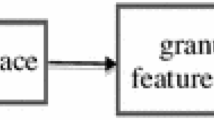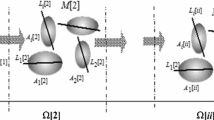Abstract
Being a source of implicit knowledge, multivariate time series (MTS) can act as models for the perception of objects in many applied areas. The article deals with the development of conceptual provisions for granular calculations of multivariate time series, on the basis of which a descriptive analysis technique is proposed that permits obtaining information granules about the state and behavior of the observed object expressed in textual form using protoforms. An application of granulation of a multivariate time series to the descriptive analysis of the development of the Russian economy is considered.
Similar content being viewed by others
Notes
Federal State Statistics Service. http://old.gks.ru/wps/wcm/connect/rosstat_main/rosstat/ru/ . Accessed March 3, 2021.
REFERENCES
Zadeh, L., Fuzzy sets and information granularity, in Advances in Fuzzy Set Theory and Applications, Amsterdam: World Sci., 1979, pp. 3–18.
Zadeh, L., Toward a theory of fuzzy information granulation and its centrality in human reasoning and fuzzy logic, Fuzzy Sets Syst., 1997, vol. 90, pp. 111–127.
Zadeh, L., Generalized theory of uncertainty (GTU)—principal concepts and ideas, Comput. Stat. & Data Anal., 2006, vol. 51, pp. 15–46.
Zadeh, L., A prototype-centered approach to adding deduction capabilities to search engines—the concept of a protoform, Annu. Meet. North Am. Fuzzy Inf. Process. Soc. (NAFIPS 2002), 2002, pp. 523–525.
Pedrycz, W., Granular computing for data analytics: a manifesto of human-centric computing, IEEE/CAA J. Autom. Sin., 2018, vol. 5, no. 6, pp. 1025–1034.
Fedotova, A.V., Vetrov, A.N., and Tarasov, V.B., Granulation of information in modeling the life cycle of complex technical systems, Naukovedenie, 2013, no. 5(18).
Pedrycz, W., Skowron, A., and Kreinovich, V., Handbook of Granular Computing, Chichester: Wiley, 2008.
Dubois, D. and Prade, H., Bridging gaps between several forms of granular computing, Granular Comput., 2016, vol. 1, pp. 115–126. https://doi.org/10.1007/s41066-015-0008-8
Yen, G., Beliakov, G., Triguero, I., Pratama, M., Zhang, X., and Li, H., Data Mining and Granular Computing in Big Data and Knowledge Processing, 2019. https://doi.org/10.1109/ACCESS.2019.2908776
Pedrycz, W., Information granules and their use in schemes of knowledge management, Sci. Iran., 2011, vol. 18, no. 3, pp. 602–610.
Han Liu and Mihaela Cocea, Fuzzy information granulation towards interpretable sentiment analysis, Granular Comput., 2017, vol. 2, no. 4, pp. 289–302. https://doi.org/10.1007/s41066-017-0043-8
Butenkov, S.A., Structural organization of granular computing in data processing on reconfigurable computing systems, Izv. Yuzhno-Ural. Tekh. Nauki, 2018, no. 8, pp. 250–262.
Butakova, M.A., Klimanskaya, E.V., and Chernov, A.V., Formal structures and representations for granular computing, Sovrem. Naukoemkie Tekhnol., 2018, no. 5, pp. 36–40.
Bargiela, A. and Pedrycz, W., Granulation of temporal data: a global view on time series, 22nd Int. Conf. North Am. Fuzzy Inf. Process. Soc., 2003, pp. 191–196. https://doi.org/10.1109/NAFIPS.2003.1226780
Donga, R. and Pedrycz, W., A granular time series approach to long-term forecasting and trend forecasting, Physica A, 2008, vol. 387, pp. 3253–3270.
Al-hmouz, R. and Pedrycz, W., Models of time series with time granulation, Knowl. Inf. Syst., 2016, vol. 48, no. 3, pp. 561–580. https://doi.org/10.1007/s10115-015-0868-x
Yarushkina, N.G. et al., Integration of fuzzy-granular and ontological methods in the problem of time series analysis, Avtom. Protsess. Upr., 2015, no. 2(40), pp. 72–79.
Afanasieva, T. and Moshkina, I., Descriptive model of temporal features of multivariate time series based on granulation, CEUR Workshop Proc., 2020, vol. 2667, pp. 287–292.
Yarushkina, N.G., Afanasieva, T.V., and Timina, I.A., Fuzzy granulation in modeling and forecasting the volume of telecommunication traffic, Naukoemkie Tekhnol., 2013, vol. 14, no. 5, pp. 67–72.
Yarushkina, N.G.and Afanasieva, T.V., Granular time series modeling, Trinadtsataya natsional’naya konf. po iskusstvennomu intellektu KII-2012 (Thirteenth Natl. Conf. Artif. Intell. CAI-2012), 2012, pp. 143–148.
Ontologicheskii i nechetkii analiz slabostrukturirovannykh informatsionnykh resursov (Ontological and Fuzzy Analysis of Semistructured Information Resources), Yarushkina, N.G., Ed., Ul’yanovsk: UlGTU, 2016.
Jun, M., LiXia, W., XiuKun, W., and TsauYoung, L., Granulation-based symbolic representation of time series and semi-supervised classification, Comput. & Math. Appl., 2011, vol. 62, no. 9, pp. 3581–3590. https://doi.org/10.1016/j.camwa.2011.09.006
Pedrycz, W., Homenda, W., Jastrzebska, A., and Yu, F., Information granules and granular models: selected design investigations, 2020 IEEE Int. Conf. Fuzzy Syst. (FUZZ-IEEE), 2020, pp. 1–8. https://doi.org/10.1109/FUZZ48607.2020.9177696
Novak, V., Linguistic characterization of time series, Fuzzy Sets Syst., 2016, vol. 285, pp. 52–72.
Glockner, I. and Knoll, A., Fuzzy quantifiers for data summarization and their role in granular computing, Proc. Joint 9th IFSA World Congr. 20th NAFIPS Int. Conf., 2001, vol. 4, pp. 2029–2034. https://doi.org/10.1109/NAFIPS.2001.944380
Kacprzyk, J., Wilbik, A., and Zadroűny, S., Linguistic summarization of time series under different granulation of describing features, RSEISP 2007, 2007, vol. 4585, pp. 230–240. https://doi.org/10.1007/978-3-540-73451-2_25
Kacprzyk, J. and Zadrozny, S., Linguistic summaries of time series: a powerful tool for discovering knowledge on time varying processes and systems, //Inf. Stosowana, 2014, vol. 1, pp. 149–160.
Kacprzyk, J., Wilbik, A., and Zadroűny, S., Linguistic summarization of time series using a fuzzy quantifier driven aggregation, Fuzzy Sets Syst., vol. 159, no. 12, pp. 1485–1499.
Afanasieva, T.V. and Rodionova, T.E., Methodology of patient-oriented assessment of cardiovascular health of men using fuzzy sets and formal conceptual analysis, World Sci. Proc. Ser. Comput. Eng. Inf. Sci. Dev. Artif. Intell. Technol. Comput. Rob., 2020, pp. 857–865.
Zadeh, L., A computational approach to fuzzy quantifiers in natural languages, Comput. Math. Appl., 1983, vol. 9, pp. 149–184.
Mörchen, F. and Ultsch, A., Mining Hierarchical Temporal Patterns in Multivariate Time Series, 2004, vol. 3238, pp. 127–140.
Song, Q. and Chissom, B., Fuzzy time series and its models, Fuzzy Sets Syst., 1993, vol. 54, pp. 269–277.
Author information
Authors and Affiliations
Corresponding author
Additional information
Translated by V. Potapchouck
Rights and permissions
About this article
Cite this article
Afanasieva, T.V. Granulation of Multivariate Time Series in the Problem of Descriptive Analysis of the State and Behavior of Complex Objects. Autom Remote Control 83, 884–893 (2022). https://doi.org/10.1134/S0005117922060066
Received:
Revised:
Accepted:
Published:
Issue Date:
DOI: https://doi.org/10.1134/S0005117922060066




